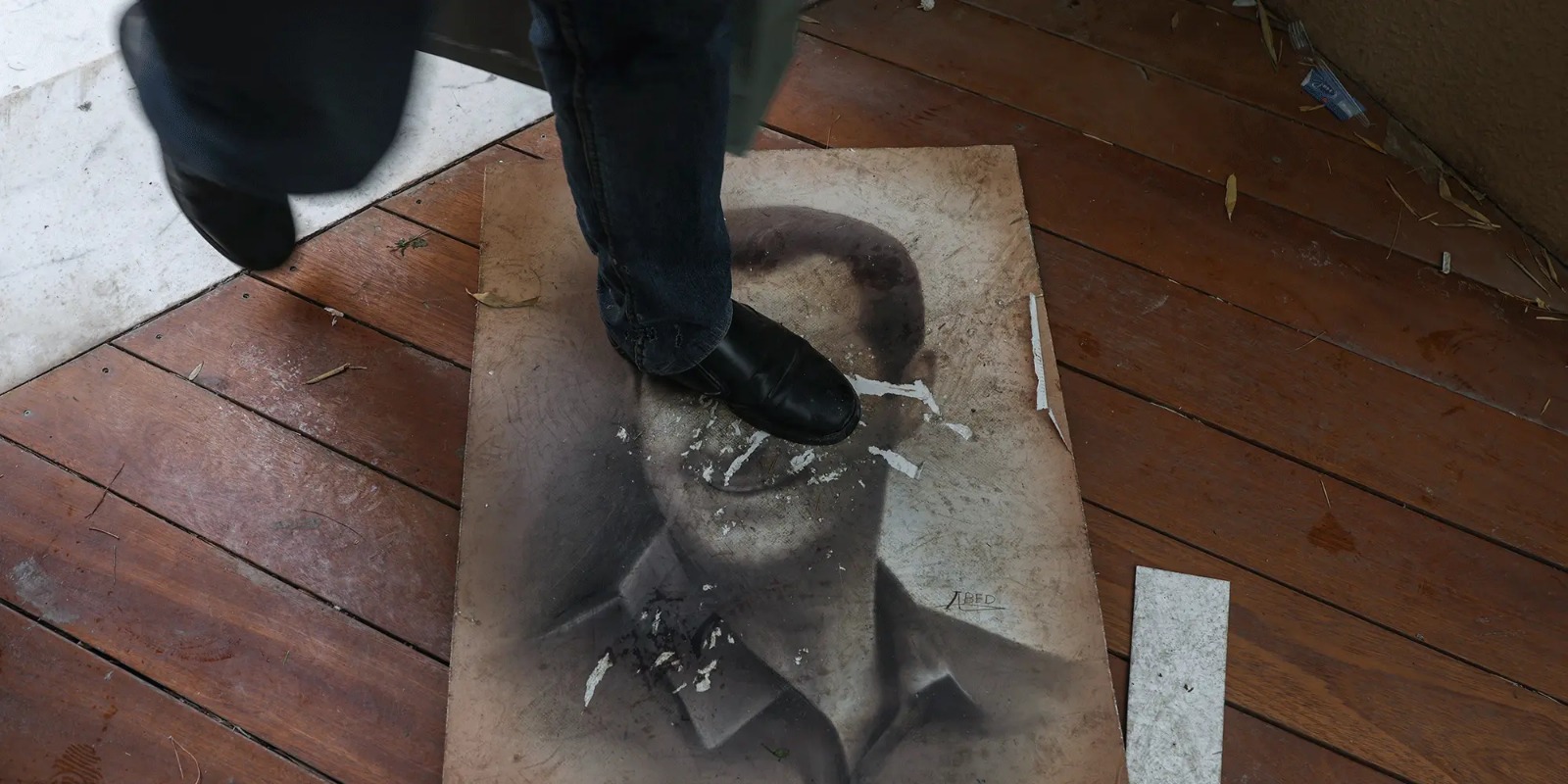It is no coincidence that those closest to Bashar al-Assad did not hesitate to unleash a torrent of insults the moment his betrayal came to light. It was as though they had been waiting for the right opportunity to curse him. It wasn’t just artists who denounced him; his prime minister, foreign minister, and the speaker of his parliament all joined the chorus of condemnation within moments of hearing about his humiliating escape.
Many within Assad’s inner circle and family are gripped by profound disappointment—not only over the fall of the regime but, more acutely, over the disgraceful manner in which he fled. The man packed his bags and departed, informing no one. Such an act of treason exemplifies the same baseness he displayed when ordering the killing of Syrians from the comfort of the Muhajirin Palace or delivering his tedious, condescending speeches to the People’s Assembly.
Rebel Representatives Meet with Elders of Qardaha, the Hometown of Bashar al-Assad
This pettiness and lack of character are integral to the essence of this incomplete man. Raised under the shadow of his father’s intelligence officers, Assad was left emotionally stunted and linguistically inept, a deficiency that was always evident in his speeches.
Bashar al-Assad left Syria without warning. Manal al-Assad, wife of his infamous brother Maher, denounced him in a tweet, calling him “the seller of the family and the homeland.” Indeed, Bashar’s betrayal of his inner circle was as disgraceful as it was shocking. His cowardice left a wide circle of supporters, both Syrian and foreign, reeling. Overnight, he forced a tragic volte-face upon countries, regimes, parties, and leaders who had supported him, erasing their reputations in the process. Figures such as Qais Saeed, Mohammed bin Zayed, Gebran Bassil, and Suleiman Frangieh found themselves abandoned as Assad fled before dawn, leaving them humiliated.
Assad was weak
The humiliation rippled across the region, from the Atlantic Ocean to the Gulf. Yet, the shame was not confined to those he betrayed. Blood had been spilled to protect Assad and his regime. Hezbollah, for instance, sacrificed countless fighters in Syria to sustain the Baath regime. What of the hundreds, perhaps thousands, of Hezbollah members killed in Syria? What did Sheikh Naim Qassem feel when he learned of Assad’s betrayal? How did Lebanese mothers feel, knowing their sons had died fighting for a man who ultimately abandoned them? Such a parallel tragedy compounds the ten years of fighting and supposed “support” that culminated in Assad’s departure to Russia.
Assad’s actions were predictable. He is the archetype of a weak dictator, incomparable to figures like Saddam Hussein. His cowardice extends even to the betrayal of his own children, leaving them behind to ensure his survival. Emotionally and intellectually underdeveloped, Assad’s legacy is that of a man with an extraordinary capacity for cruelty, deception, and flight.
This is the Bashar al-Assad who inherited his father’s machinery of death and a coterie of killers, to which he added corrupt relatives and opportunistic friends. He ruled Syria with his father’s iron fist, the avarice of his cousin Rami Makhlouf, and the brazenness of his brother Maher. Saydnaya prison, a “human slaughterhouse” under Hafez al-Assad, became under Bashar a site of even greater horror, with the addition of a “human press”—a monstrous device used to compress the bodies of executed detainees, making them easier to bury in mass graves. This brutality is not new; it is the culmination of a legacy shaped by Baathist officers who absorbed techniques from Nazi experts hosted by the regime since the 1960s.
Assad’s betrayal extended to all corners. Hamas, on the verge of resuming ties with Damascus, swiftly welcomed the regime’s fall. Even Tehran and Moscow withheld any overt expressions of regret.
Bashar’s departure left behind a haunting tableau of the regime’s crimes, magnifying the horrors of his father’s era. Images of Syria’s notorious prisons, pervasive poverty, and systemic abuses further illuminate the atrocities of Hafez al-Assad’s rule. Bashar has not only fled his father’s crimes but also left them exposed for the world to see. As Syrians mock his idle exile in Moscow, they fail to grasp that this man, devoid of shame or dignity, is impervious to their ridicule. His legacy is not only one of playing with the blood of his victims but, as it turns out, the blood of his protectors, family, and allies.
This article was translated and edited by The Syrian Observer. The Syrian Observer has not verified the content of this story. Responsibility for the information and views set out in this article lies entirely with the author.


